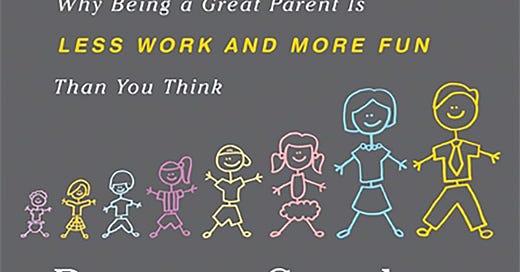Desired Fertility versus the Mueller Effect
Are women really having fewer kids than they want?
Six months ago, I’m not sure that I’d ever heard of demographer Lyman Stone. Now, people in my circles randomly drop his name on a weekly basis. His favorite topic, in case you haven’t heard, is global fertility decline. As a longtime natalist, I share his concerns. One of Stone’s top takeaways: Instead of talking about the social dangers of low fertility, natalists should talk about the fact that women are failing to achieve their personally desired fertility. As he explains:
Pro-natal policy should be justified simply in terms of what people want—that is, desired childbearing. As fertility rates have declined around the world, they have reached a critical threshold: not the much-heralded “replacement rate” at which point the average woman’s childbearing will balance mortality in the long run, but the even-more-important “preferred fertility rate” at which the average woman is having the number of children she wants to have…
Given the pent-up demand for childbearing, governments should target policy to address the preferred fertility rate. Rather than sketch doomsday scenarios, policymakers can make a simple and compelling pro-natal argument. They can say: most people want to have kids.
While I sympathize, Stone’s argument about fertility versus desired fertility instantly reminds me of a parallel debate about government spending versus desired government spending. When asked, people around the world voice a clear desire to increase almost every kind of government spending. As Larry Bartels explains:
Citizens in every country in every year wanted additional government spending on health, education, old age pensions, the environment, and law enforcement.
While this result seems crystal-clear, muddying the waters is fairly easy. As Eva Mueller pointed out 60 years ago, public support for government spending sharply declines if you merely mention the banal fact that spending requires taxes. The full significance of this “Mueller effect” remains unsettled: Does it show that the public wants smaller government, the status quo, or just a smaller increase than naive estimates suggest? Yet we can extract a big lesson from the debate: Mentioning drawbacks — including drawbacks that “go without saying” — shifts people’s reported desires.
So what? Well, if you can’t take self-reported desired government spending at face value, you shouldn’t take self-reported desired fertility at face value either. Pointing out the obvious fact that government spending requires taxes sharply reduces desired government spending. Isn’t it probable that analogous rewording would sharply reduce desired fertility? A rewording along the lines of, “Given the current cost of kids in time and money, how many do you desire to have”?
When I asked Lyman about this issue, he pointed me to work showing that on fertility surveys, priming effects are weak. That doesn’t surprise me, because priming effects are generally weak. But I see a massive distinction between question-wording effects and priming effects, between the straightforward idea that “Changing the question you ask changes the answer to the question” and the speculative idea that “Changing the questions you ask before you ask a question changes the answer to the question.”
The good news: Lyman tells me his work-in-progress will explicitly address Mueller effects for fertility. My forecast is that adding a cost warning will indeed matter. If I’m right, where does that leave the case for natalism? Exactly where I left it when I wrote Selfish Reasons to Have More Kids. Specifically:
Rather than claim that people are, in some sense, “having fewer kids than they want,” my book argues that people are having fewer kids than they would have if they understood behavioral genetics and adjusted their parenting style accordingly. Once you accept that our society grossly overestimates the effects of nurture on children’s adult outcomes, parents can relax in good conscience, which in turn raises selfishly optimal family size.
Behavioral genetics aside, the net externalities of children are positive. Indeed, the long-run fiscal externalities alone are so positive that extended tax holidays for parents more than pay for themselves. My (corrected) math back in 2011: “the per-child externality falls to about $83,000—roughly 180% of per-capita GDP. This is still about nine times larger than the estimated tax credit the U.S. government would have to offer to induce parents to have another child.” So instead of saying that people are “having fewer kids than they want,” why not just affirm that they’re “having fewer kids than they would have if the tax code recognized the positive externalities of fertility”?
P.S. Good news: The publisher is Selfish Reasons to Have More Kids is interested in publishing a reprint with an extended new introduction and a new cover. As I often say, this is the only book I’ve written that’s clearly improved the world. Indeed, by my math the book has created billions of dollars of value, though I captured well under .01% of that surplus.





Glad to hear about the reprint! This book fits in so nicely with changing contemporary concerns that I’m sure it will have a wonderful Renaissance!